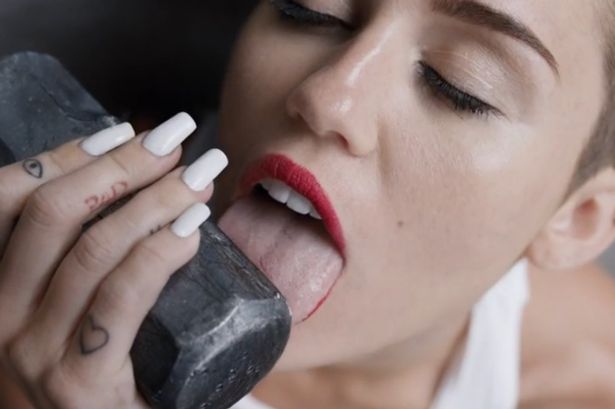Why the Miley Cyrus transformation to Wrecking Ball level should be celebrated
Trying to shock audiences at award shows isn't anything new - but this time it's moved into mocking territory

Your support helps us to tell the story
From reproductive rights to climate change to Big Tech, The Independent is on the ground when the story is developing. Whether it's investigating the financials of Elon Musk's pro-Trump PAC or producing our latest documentary, 'The A Word', which shines a light on the American women fighting for reproductive rights, we know how important it is to parse out the facts from the messaging.
At such a critical moment in US history, we need reporters on the ground. Your donation allows us to keep sending journalists to speak to both sides of the story.
The Independent is trusted by Americans across the entire political spectrum. And unlike many other quality news outlets, we choose not to lock Americans out of our reporting and analysis with paywalls. We believe quality journalism should be available to everyone, paid for by those who can afford it.
Your support makes all the difference.‘No we can’t stop, no we won’t stop’ flaunts Miley Cyrus on her brash, crass and controversial hit that has dominated charts all summer.
Last month’s accompanying VMA performance stretched this statement to the max – twerking, grinding and gesticulating a frenzied reaction out of audiences worldwide. This week, the video for her latest single “Wrecking Ball” launched, breaking YouTube records by featuring her completely naked. Yet as quickly as marketing bosses revel in their victory, the way derision has turned to ridicule speaks volumes. Both spectacles prove just how bereft of ideas the industry has become.
Of course, shocking at award shows is nothing new. Madonna opened the floodgates by writhing around on the floor in a wedding dress whilst performing “Like A Virgin” way back in 1984. Compare it to Miley, and it feels suitable for Sunday mass.
Although the two exhibitions share the same fundamental value of using sex to sell, it would be wrong to suggest Miley’s coming of age attempt paid justice to the Material Girl. Madonna was clever enough to refrain from bearing herself completely, aware that it would cheapen the act. This allowed the message – that girls should be confident in enjoying sex and sexuality for their own pleasure – to be heard loud and clear.
This subtlety was respected when Britney Spears shed her Disney Club image at 2000’s VMAs, confidently stripping from a pinstripe suit to bikini during a cover of The Rolling Stones’ “Satisfaction”. Putting aside the inherent objectification, the dance moves were well choreographed, strong and dominant. This was a pop-star seemingly in charge and on top of her game.
Fast forward thirteen years, and Miley, this decade’s Disney Club clone, was not afforded such dignity in her coming of age awakening. Born into the media spotlight, and nurtured for commercial stardom from a young age by her singer/song-writer father, Billy Rae, Miley signed with RCA records last year. New manager, Larry Rudolph, decided the time was ripe, aged 20, to elevate her into pop’s elite circle of nubiles.
In some ways it is difficult not to feel sorry for her. The only response the industry has mustered to the liberated media landscape, where choice comes as standard for the YouTube generation, is hypersexualisation. And so, wearily, what started with Rihanna’s “S&M” morphed into Miley re-appropriating twerking: a sexual, often racialised dance move, for a mass white audience.
If things had ended there, audiences might have stomached it. But the submissive grinding and crotch grabbing toward Robin Thickle during the “Blurred Lines/Give it 2 U” duet came across as desperate. Add the seemingly drugged up facial expressions, very little clothing and suggestive fingering with a giant foam hand, and any sensuality was replaced by gratuitous female degradation. The ambition to mirror Madonna and Britney remained cartoonish.
Whereas previous concoctions of pop and shock found an audience, fortunately Miley’s recipe is too one dimensional. So, while the performance may have earned more than 50,000 likes on the day, there is a sense that the balance could have shifted. The “We Can’t Stop” video and VMA performance have turned her marketing campaign into something of a laughing stock. A theme continued by the video for new track “Wrecking Ball”, which contains more substance than its predecessor in prospect, but has been smothered by nudity. And Miley suggestively licking a hammer.
Although marketing bosses can claim 19 million views in 24 hours makes the sacrifice worthwhile, the strength of the backlash - epitomised by Anna Wintour reportedly cancelling Miley’s Vogue cover - suggests pop’s sex obsession has gone as far as it can in lieu of artistic merit. That is something worth celebrating. Thank you Miley.
Join our commenting forum
Join thought-provoking conversations, follow other Independent readers and see their replies
Comments